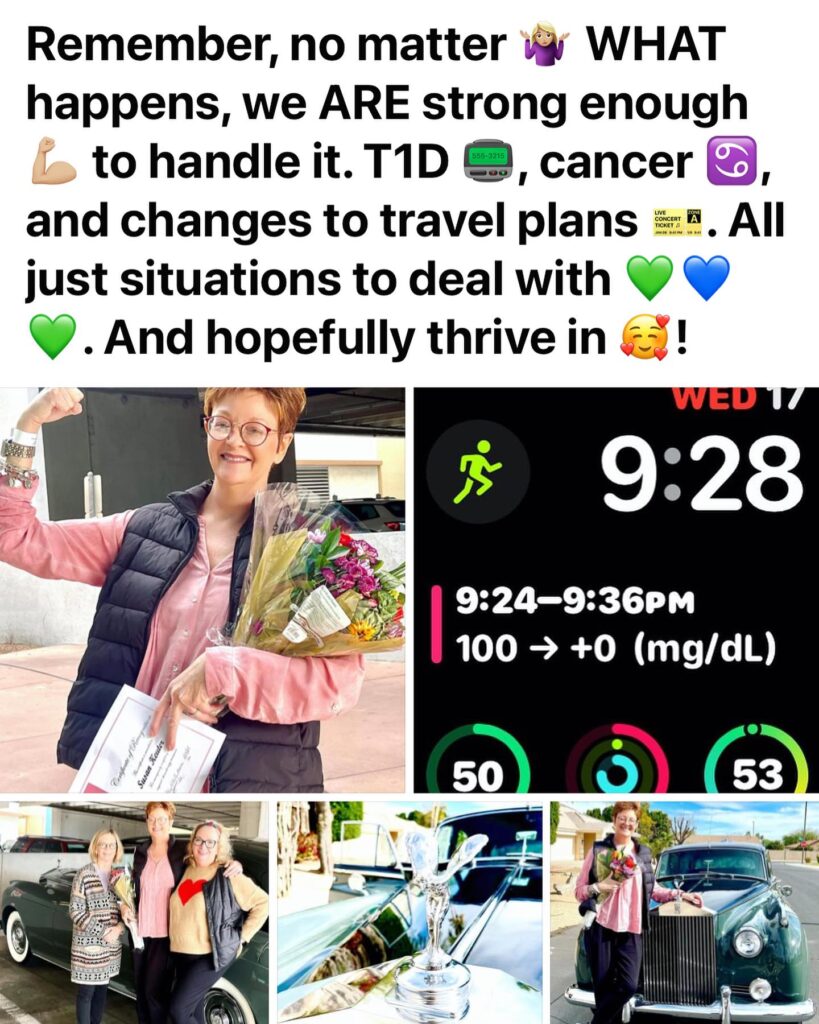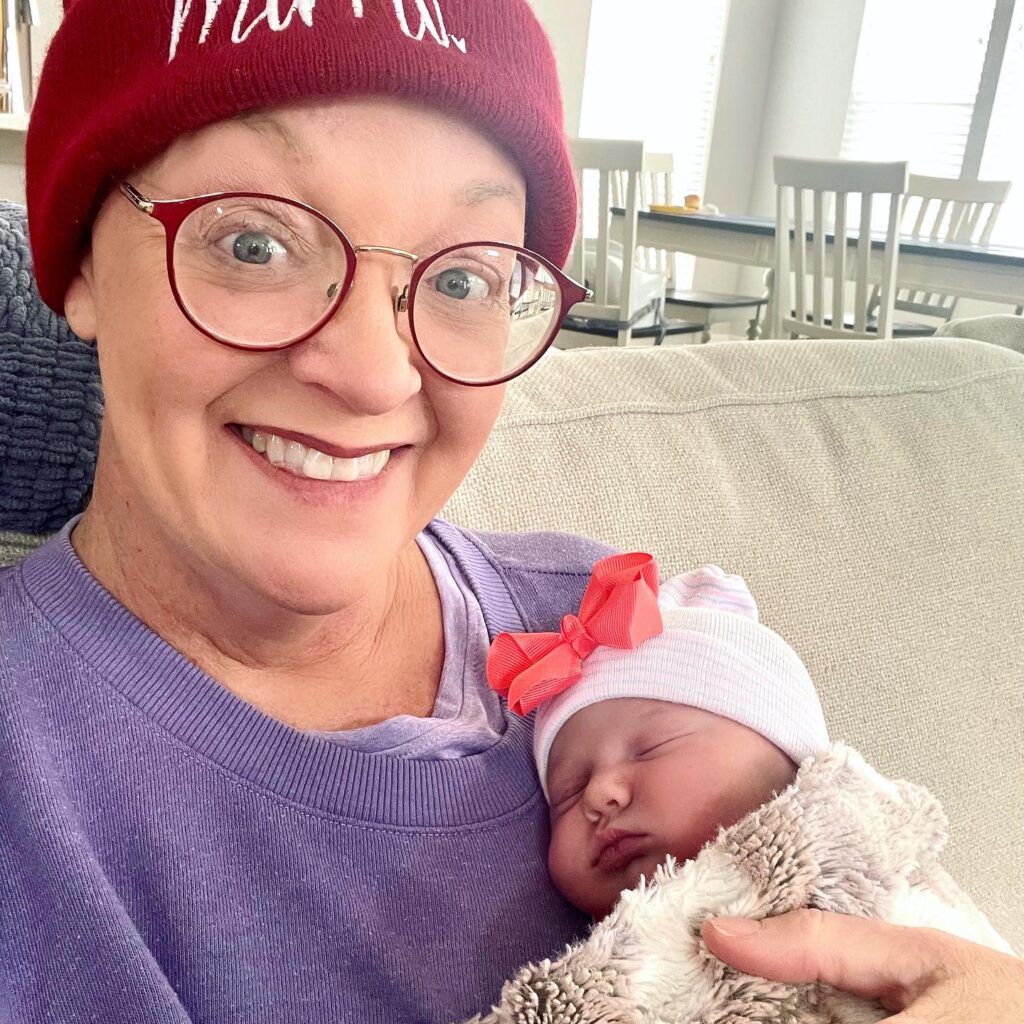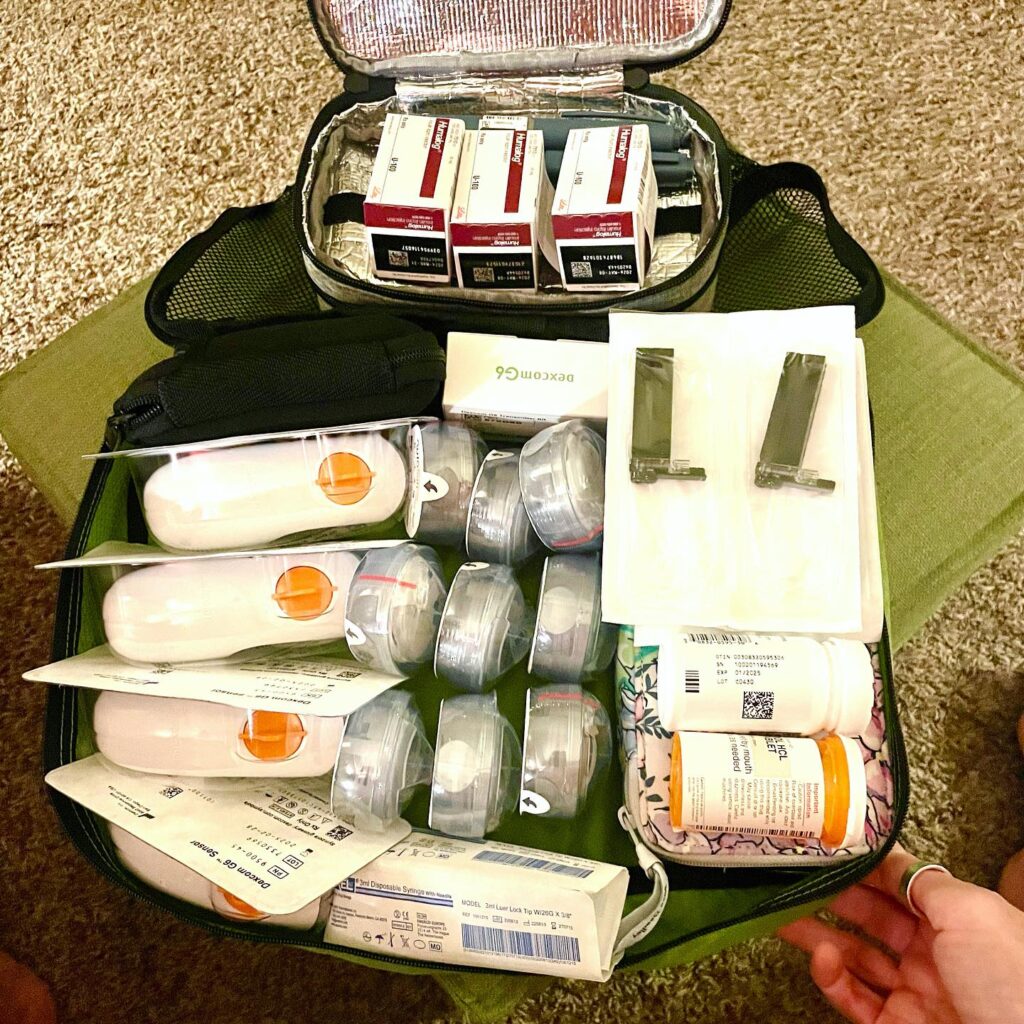T1D Mimi Facebook Community Leader Finishes Treatments in Time to Get to Nebraska for Birth of Third Granddaughter
As the Symposium for Metabolic Health unfolded last month in Boca Raton, Florida, illuminating the latest insights into type 1 diabetes management across two dedicated days of presentations and workshops, a remarkable narrative was unfolding far from the conference halls.
Susan Keuter, whose journey intertwines the relentless challenge of type 1 diabetes with a courageous battle against metastatic breast cancer, was concluding her chemotherapy and radiation treatments. Amid her treatments, Susan held onto the hope of getting to Nebraska for the arrival of her third grandchild, a moment that promised joy amidst adversity.
It was through Lester Hightower, a speaker at the Symposium (watch his presentation here) and an important voice in the type 1 diabetes community, that I became aware of Susan’s inspiring story. Lester, who has navigated the path of type 1 diabetes management with his son Andrew, told me about Susan’s resilience and determination, shared through her T1D Mimi Facebook page.
On January 17th, Susan celebrated the completion of her rigorous chemotherapy and radiation treatments for metastatic breast cancer, a journey she navigated with the same tenacity she applied to managing her type 1 diabetes for over four decades.

In a Facebook post the next day, Susan wrote: “I’m done. Twelve doses in 12 weeks… So many changes. But one thing stayed exactly the same…lead with protein.” Susan’s unwavering commitment to her health, highlighted by her adherence to a low-carb, high-protein diet, has been a cornerstone of her resilience, maintaining her strength and vitality through the trials of treatment.
The celebration of Susan’s last chemo infusion was a vivid display of joy, support, and community spirit. She posted, “So to celebrate my last chemo infusion, my two besties picked me up in a 1960 Rolls Royce! There were flowers, tears, bell ringing, champagne, more tears, applause, a little dancing, and hugs galore.” This moment was not just a personal victory for Susan but a shared triumph with nurses, patients, friends, and family, all of whom played a role in her journey.
Adding to the whirlwind of emotions and achievements, Susan shared the news that her third granddaughter was going to arrive early.
“Tomorrow, I rest. Because Friday I’ll be a crazy woman! Why? Because we found out late yesterday that grandgirlie v3.0 is coming early! Which means I’m flying out this Saturday, instead of a week from Saturday. Bring on the panicked packing!”
Susan’s updates, filled with anticipation and love, culminated in a joyous announcement of her granddaughter’s birth, a moment made all the more poignant by Susan’s health battles.
“Welcome to the world Little Miss! She made her debut at 1:24 pm, on Wednesday 1/24/24! I feel like 24 is going to be our lucky number for a while!” Susan shared, her words echoing the relief, joy, and overwhelming love that marked this new chapter in her life. Despite the challenges, Susan’s focus remained steadfast on her family, showcasing her indomitable spirit and the profound motivation driving her to stand up to the challenges brought by cancer and diabetes.
“Remember, no matter WHAT happens, we ARE strong enough to handle it. T1D, cancer, and changes to travel plans. All just situations to deal with. And hopefully thrive in.”
Confronting Cancer as a Type 1 Diabetic: A Grandmother’s Resolve
Susan Keuter, an elementary school substitute teacher and a long-standing type 1 diabetes patient, faced her cancer diagnosis with an unwavering resolve, driven by a deeply personal deadline: the birth of her new grandchild. Her journey through cancer treatment was marked by a bold defiance of expectations and a pioneering approach to managing her diabetes alongside chemotherapy and radiation.
Upon her diagnosis, Susan’s initial interaction with her oncologist set the tone for her determined approach. She insisted on being treated like any other patient, refusing to let her diabetes define her cancer treatment. “Forget I’m diabetic,” she urged her doctor, emphasizing, “I’m probably healthier than her and her and her,” as she looked around the room. This steadfast attitude was not about denying her condition but about asserting her capacity to handle the treatment despite her diabetes.
Susan’s treatment regimen included a challenging course of steroids, known for their particularly harsh effects on blood sugar levels. Yet, she navigated this with strategic insulin dosing, maintaining stable A1C levels throughout. “Steroids are the devil… But they did their job because my tumors shrank,” she recounted, highlighting her success in turning a potential obstacle into a triumph. Her meticulous management showcased not only her resilience but also her deep understanding of her body’s needs.
As her treatment progressed, Susan’s oncologist became increasingly astonished by her exceptional health markers, describing her bloodwork as “unheard of” for a cancer patient undergoing such intensive therapy. “Your platelets are normal, and your liver functions are normal,” he noted, attributing these remarkable outcomes to her diet and diabetes management. Susan’s disciplined approach, which included a therapeutic low-carb diet, not only helped her navigate her cancer treatment more smoothly but also challenged her medical team’s expectations of diabetic cancer patients.
The motivation behind Susan’s extraordinary journey was her desire to be present for her family, especially to welcome her new grandchild into the world. “You are going to have a new opinion about diabetic cancer patients,” she confidently told her oncologist, emphasizing her role as a grandmother over her identity as a patient.
Navigating Type 1 Diabetes: From Diagnosis to Self-Advocacy
At the age of 18, Susan was diagnosed with type 1 diabetes, marking the beginning of a lifelong journey that has spanned four decades. Her initial encounter with her diagnosing endocrinologist was less than ideal; he bluntly informed her of her condition with a grim prognosis. “He told me I’d be dead by 35 and that nobody would ever want to marry me,” Susan recalled.
Despite the apparent lack of empathy from her healthcare provider, Susan embarked on a self-guided path to managing her diabetes, a journey that was both challenging and enlightening. “I left with my insulin and my syringes. And we didn’t have glucometers yet in 1985,” she recalls, highlighting the stark contrast between the tools available to her then and the advancements in diabetes care today. The acquisition of her first glucometer a month later, which cost $690, was a significant milestone, changing her approach to managing her blood sugar levels and providing a newfound sense of control.
Susan’s early experiences led her to question and, in many cases, defy conventional medical advice. “I definitely realized early on that your blood sugar postprandial (after meals) was definitely better if you didn’t have a hamburger bun at lunch, and you just ate a double burger,” she explained, intuitively gravitating towards what would now be recognized as a low-carb approach. Her skepticism towards the medical establishment’s dietary guidelines was compounded by the realization that the insulin regimens prescribed often didn’t align with her dietary intake.
This sentiment of disillusionment with mainstream medical advice has persisted throughout Susan’s journey with diabetes. Her early defiance of dietary norms and the questioning of prescribed insulin dosages not only shaped her personal approach to diabetes management but also highlighted the broader challenges and limitations of the healthcare system’s handling of diabetes care. Nearly 40 years later, Susan’s experiences underscore the importance of personalized care, the value of self-advocacy in managing chronic conditions, and the need for a more nuanced understanding of dietary management in diabetes.
Building a Community: Susan’s Engagement in Diabetes Groups
Throughout her journey with type 1 diabetes, Susan has actively participated in several groups and pages that focus on diabetes management, particularly advocating for a low-carb, high-protein approach. One of the first groups she joined was Type One Grit, which she said resonated deeply with her philosophy and approach to diabetes care. “These are my people. These literally are my people,” she recalls, emphasizing the instant connection she felt with the group’s members. Susan said she has also been impacted by other Facebook communities and groups, including Type One Normal and Let Me Be 83.
The type 1 diabetes community she found on Facebook helped Susan feel understood and supported, and offered her a platform to share and validate her experiences with diabetes management.
Susan also runs her own Facebook page, T1D Mimi, (referenced above) where she adopts a personal and relatable approach to sharing her journey and insights. She emphasizes the philosophy of taking one day at a time and celebrates every small victory. “All progress is progress. If your blood sugar is better today than it was yesterday, you win,” she asserts, highlighting her belief in incremental progress rather than an all-or-nothing approach. This perspective has made her page a source of inspiration and practical advice for many navigating the complexities of diabetes.
Susan’s involvement in these communities is not just about sharing her success with a low-carb lifestyle; it’s about challenging the status quo and encouraging a dialogue that questions conventional medical advice. “So many of us are basically going against our doctor’s wishes,” she notes, revealing a collective defiance against a one-size-fits-all approach to diabetes care. Her advocacy extends beyond just diet; it’s about empowering individuals to seek out information, ask critical questions, and find a support system that acknowledges their unique experiences and challenges.
Overcoming Fears with Determination and a Low-Carb Lifestyle
Susan’s experience has been shaped significantly by her fears and her steadfast resolve to confront them head-on. Early in her life, the prospect of losing her eyesight to diabetic retinopathy or facing neuropathy and amputations were her greatest fears. “I can’t conceive of being a blind mother… That’s not something that I thought I could tolerate,” she expresses, highlighting the terrifying potential complications of unmanaged diabetes. This fear became a powerful motivator for Susan, driving her to maintain strict control over her blood sugar levels. “Well, then don’t get high blood sugar. I mean, that doesn’t seem that complicated to me,” she says.
Susan’s commitment to a low-carb, high-protein diet is not just about managing her diabetes; it’s about preserving her quality of life and being there for her family. She understands that dietary choices directly impact her health outcomes, preferring to forgo a bagel if it means she can enjoy life’s experiences fully. “I would rather make sure that I can see St. Patrick’s Cathedral and the Empire State Building and a Broadway play, like screw bagels,” Susan remarks, illustrating her priorities and her willingness to make intelligent choices for her health.
Embracing the Buffalo: Susan’s Mantra for Resilience
Susan’s challenges with type 1 diabetes and cancer have been underpinned by a powerful and evocative mantra: “Be the buffalo.” Drawing inspiration from the natural world, she compares her approach to facing life’s storms to that of the buffalo on the Great Plains. Unlike other animals that flee at the first sign of a storm, buffaloes charge directly into it. “The buffalo never runs from a storm… They paw at the earth, they put their head down and they charge into the storm,” Susan explains.
This philosophy has not only guided Susan through her health battles but also shaped her interactions and advice within the type 1 diabetes community. “Be like the buffalo… the fastest way to get through the storm is to run into it,” she states, urging others to face their fears and challenges with courage and determination. Whether it’s dealing with a difficult diagnosis, navigating the complexities of diabetes management, or advocating for oneself in the face of unsatisfactory medical advice, Susan emphasizes the importance of resilience and proactive action.
Type 1 Diabetes Playlist
LowCarbUSA has been releasing all of the video presentations on type 1 diabetes management from 2024 Boca Symposium for Metabolic Health held this past January. By mid-March, the playlist will feature more than 15 videos, each offering a unique perspective on type 1 diabetes management. We urge you to subscribe to our YouTube channel and connect with us on Facebook, Instagram, Twitter, and LinkedIn to stay updated and help amplify this important content. Remember, these videos are a FREE resource offered to our community. We believe in the power of knowledge and are committed to making this vital information accessible to everyone.




